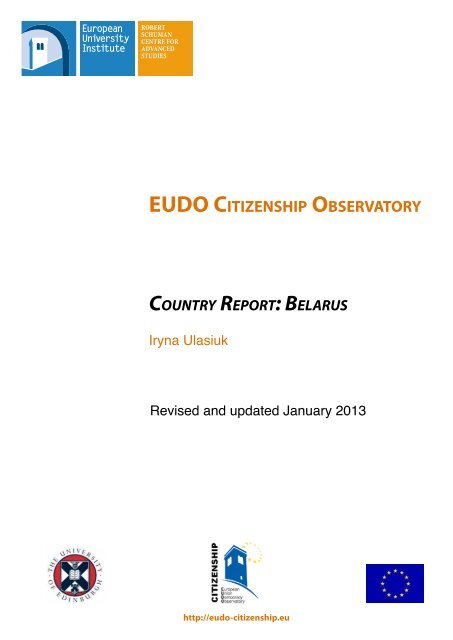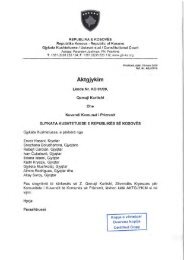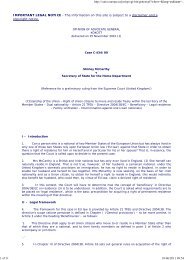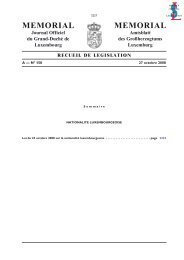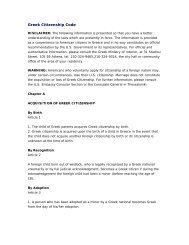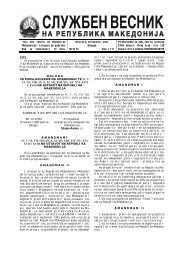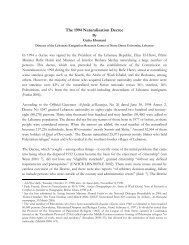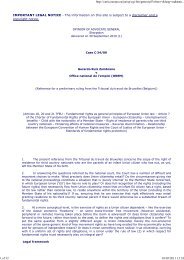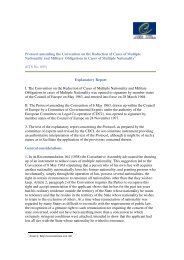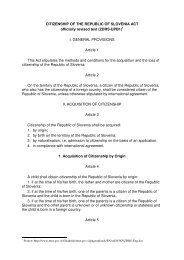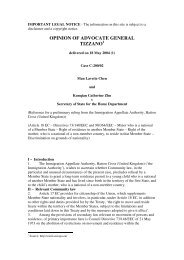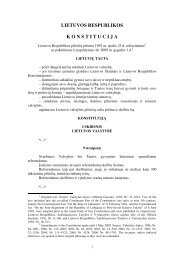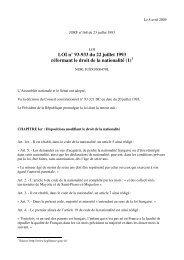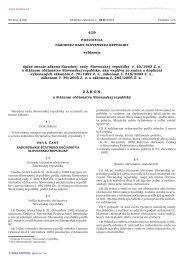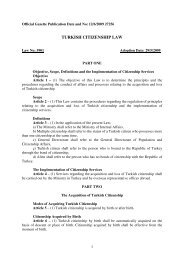Belarus updated November 2012 - EUDO Citizenship
Belarus updated November 2012 - EUDO Citizenship
Belarus updated November 2012 - EUDO Citizenship
Create successful ePaper yourself
Turn your PDF publications into a flip-book with our unique Google optimized e-Paper software.
<strong>EUDO</strong> CITIZENSHIP OBSERVATORYCOUNTRY REPORT: BELARUSIryna UlasiukRevised and <strong>updated</strong> January 2013http://eudo-citizenship.eu
European University Institute, FlorenceRobert Schuman Centre for Advanced Studies<strong>EUDO</strong> <strong>Citizenship</strong> ObservatoryReport on <strong>Belarus</strong>Iryna UlasiukRevised and <strong>updated</strong> January 2013<strong>EUDO</strong> <strong>Citizenship</strong> ObservatoryRobert Schuman Centre for Advanced Studiesin collaboration withEdinburgh University Law SchoolCountry Report, RSCAS/<strong>EUDO</strong>-CIT-CR 2013/2Badia Fiesolana, San Domenico di Fiesole (FI), Italy
© Iryna UlasiukThis text may be downloaded only for personal research purposes.Additional reproduction for other purposes, whether in hard copies or electronically,requires the consent of the authors.Requests should be addressed to eudo-citizenship@eui.euThe views expressed in this publication cannot in any circumstances be regarded asthe official position of the European UnionPublished in ItalyEuropean University InstituteBadia FiesolanaI – 50014 San Domenico di Fiesole (FI)Italywww.eui.eu/RSCAS/Publications/www.eui.eucadmus.eui.euResearch for the <strong>EUDO</strong> <strong>Citizenship</strong> Observatory Country Reports has been jointly supported, at various times,by the European Commission grant agreements JLS/2007/IP/CA/009 EUCITAC and HOME/2010/EIFX/CA/1774 ACITand by the British Academy Research Project CITMODES (both projects co-directed by the EUIand the University of Edinburgh). The financial support from these projects is gratefully acknowledged.For information about the project please visit the project website at http://eudo-citizenship.eu
<strong>Belarus</strong>Iryna Ulasiuk1 IntroductionAfter the disintegration of the Soviet Union and the subsequent formation of fifteenindependent states, the issues of citizenship have proved to be extremely contentious in theformer republics. As Ginsburg (1992: 1) put it, ‘sorting out who will “belong” to whom’inevitably entailed a range of problems, legal considerations but also ‘such primal (volatile)concerns as ethnic affiliation, cultural affinity, minority entitlements, and human rights’. The‘zero option’ adopted in <strong>Belarus</strong> with the introduction of the new citizenship law grantedcitizenship 1 to all the individuals, who at the moment of the entry into force of the law (12<strong>November</strong> 1991) were residing permanently on the territory of the Republic of <strong>Belarus</strong>.However, while the Soviet Union was quickly dissolving, many citizens of the thenByelorussian Soviet Socialist Republic (BSSR) found themselves in other Soviet republics.This led to a situation in which they acquired a new citizenship (other than <strong>Belarus</strong>ian). Insome cases this acquisition was in correspondence with the will of the persons concerned, inothers, the latter were just unaware of the fact. Similarly, many citizens of the USSR,residing permanently in <strong>Belarus</strong>, automatically acquired <strong>Belarus</strong>ian citizenship when thecorresponding law came into force, sometimes not knowing that they were also citizens ofother republics. Further complexity was added where persons who held BSSR citizenship, butwho happened not to be residing permanently there on 12 <strong>November</strong> 1991, lost it,independently of their own will. As a result, families were ‘separated’: spouses, parents andchildren ended up being citizens of different states. 2 The most recent 2002 citizenship lawwith subsequent amendments aimed at redressing the described complexities and respondingto present day necessities. To what extent this goal has been achieved or has remained anunfulfilled objective will be explored in the present report.The report is informed by an in-depth study of legislative and policy documents,supplemented by references to research done so far 3 in order to provide a better understandingof the actual ways in which citizenship issues are managed in the Republic of <strong>Belarus</strong>. Theargument is structured in three parts. The first part familiarises the reader with the historicaldevelopment of the <strong>Belarus</strong>ian state as a necessary background for comprehending presentday citizenship laws and policies. The second part presents an overview of laws andregulations governing citizenship issues in <strong>Belarus</strong> through the prism of internationalstandards. Although <strong>Belarus</strong> is not a member of the Council of Europe and thus not a party tothe 1997 European Convention on Nationality, an attempt will be made to see whether and towhat extent <strong>Belarus</strong>ian legislation voluntarily complies with the requirements of the!!!!!!!!!!!!!!!!!!!!!!!!!!!!!!!!!!!!!!!!!!!!!!!!!!!!!!!!!!!!1 Similarly to other countries of the former Soviet Union, the <strong>Belarus</strong>ian legislator makes a distinction betweenthe terms ‘citizenship’ and ‘nationality’. Whereas ‘citizenship’ makes reference to the legal bonds of the personwith the state; ‘nationality’ is associated with the ethnicity of the person. http://eudo-citizenship.eu/citizenshipglossary/terminology.2 K. Anufrievich, ‘The Law Divided My Family’ [!"#$%&'(&) *., +,-." %,/0'1&1 2.3 4'253], SovetskaiaBelorussia, 11 <strong>November</strong> 1996; Yu Belous, ‘Without <strong>Citizenship</strong> but with Two Passports?’, [6'1.#4 7. 841&9'/ :%,;0,"4
Convention, together with other relevant international instruments. The third part addressestwo issues which are currently debated in <strong>Belarus</strong>, namely dual citizenship and <strong>Belarus</strong>ianreaction to the introduction of the ‘Polish Ethnicity Card’ by Poland. The conclusions sum upthe most important findings of the report.2 Historical background and changesThe history of <strong>Belarus</strong> ‘has been exceptionally intertwined’ (Sanford 1997: 231) with that ofKievan Rus, Lithuania, Poland and Russia. In the fourteenth century the <strong>Belarus</strong>ian landsbecame part of the Grand Duchy of Lithuania. The 1569 Lublin Treaty united Poland and theGrand Duchy in a Commonwealth of the two nations that later became known as the PolishRepublic. From the partitioning of Poland in the late eighteen century up to the 1917revolution, <strong>Belarus</strong>ian lands were part of the Russian Empire. In 1918, an independent<strong>Belarus</strong>ian state – the People’s Republic of <strong>Belarus</strong> – was proclaimed. However, its existencelasted only for a few months ‘due to the overwhelming odds against it’: the presence offoreign armies, claims on its territory by Russia and Poland, and the <strong>Belarus</strong>ian population’slow national consciousness (Zaprudnik 1998: 51).In 1921, the Treaty of Riga divided the country between Poland and Soviet Russia,with the eastern territory becoming part of the BSSR, proclaimed in 1919. The <strong>Belarus</strong>ianlands were reunited twenty years later, in 1939. One of the first acts of the government of<strong>Belarus</strong> concerning citizenship was the Decision of the Sovnarkom (Government) OnGranting <strong>Belarus</strong>ian <strong>Citizenship</strong> to Foreigners adopted on 19 <strong>November</strong> 1921. Less than ayear later, on 4 August 1922 it was replaced by a more comprehensive Law on Foreignerswhich stipulated a detailed procedure of the acquisition and loss of <strong>Belarus</strong>ian citizenship.According to this law, all subjects of the former Russian Empire who had permanentresidence in the BSSR, including refugees, were recognised as citizens of the BSSR. Citizensof other Soviet Republics shared common rights and obligations with the citizens of theBSSR. All adults could apply for <strong>Belarus</strong>ian citizenship. Children under the age of fourteenacquired <strong>Belarus</strong>ian citizenship automatically, while for children over fourteen their consentwas necessary. Additionally, anyone could renounce citizenship. Persons acquiringcitizenship had to make a signed statement that they ‘pledge to respect and defend theconstitutionally established state order’. According to Article 3 (14) persons permanentlyresiding abroad lost <strong>Belarus</strong>ian citizenship if they either left <strong>Belarus</strong> without due permissionof the authorities; or voluntarily served in foreign military forces fighting against the Sovietpower, or renounced their right to <strong>Belarus</strong>ian citizenship (Vashkevich 1997: 182). The 1930scitizenship laws of the USSR declared that citizens of the USSR who lived in the territory of aSoviet Republic would become citizens of that Republic, unless they opted for citizenship ofanother Soviet Republic in view of their nationality, that is, their ethnic origin. However, upto the demise of the Soviet Union, republican citizenship was overshadowed by Sovietcitizenship and remained symbolic rather than real (Ginsburgs 1983: 30). This situation wasdestined to change dramatically in the 1990s.1991-2002<strong>Citizenship</strong> issues have been a matter of intense legal regulation in <strong>Belarus</strong> since the 1990s.The BSSR issued its Declaration of State Sovereignty on 27 July 1990. 4 This was the first!!!!!!!!!!!!!!!!!!!!!!!!!!!!!!!!!!!!!!!!!!!!!!!!!!!!!!!!!!!!4 Available in Russian at: http://pravo.kulichki.com/zak2007/bz63/dcm63406.htm.
step towards eventual independence in 1991. Following the August 1991 coup d’état inMoscow and declarations of independence by Estonia, Latvia and Ukraine, the SupremeSoviet in Minsk declared the independence of <strong>Belarus</strong> on 25 August 1991 by giving itsDeclaration of State Sovereignty the status of a constitutional document and officiallychanging the name of the state from the Byelorussian Soviet Socialist Republic to theRepublic of <strong>Belarus</strong>. In view of the imminent dissolution of the Soviet Union 5 questions ofcitizenship and state succession were two extremely important aspects which have given riseto extensive debates in all Soviet republics (Brubaker 1992, Barrington 1995) and haveaffected relations between former Soviet republics on numerous occasions, as the practice ofpost-Soviet decades has demonstrated. One by one the Soviet Republics started to enact therelevant legislation to clarify the status of persons in regard to their citizenship and connectedissues arising from state succession (Gasca 2009, Järve and Poleshchuk 2009, Kruma 2009,Kuris 2009, Makaryan 2010, Shevel 2010). In <strong>Belarus</strong> a long and hard debate culminated on18 October 1991 in the adoption of a new Law on <strong>Citizenship</strong>, 6 which ‘was described as thevictory of civic wisdom and sense of responsibility for the destiny of whose who lived there’(Ginsburgs 1993: 253), a ‘liberal’ law (Mitskevich 1996: 31) and even the most ‘humane’ lawin the post-Soviet space (Vashkevich 1997: 193). The law was ‘purged of all ingredientscapable of inciting socio-political tensions’ and thus void of elements which could lead to‘distrust in the regime’ (Ginsburgs 1993: 253). In <strong>Belarus</strong> it was proposed to deal withcitizenship by adopting the so-called ‘zero option’, which is quite common in the practice ofstate succession (Bloed 1998: 45). The zero option foresees granting citizenship to all peopleliving in a given state territory either at the moment of the declaration of independence orfrom the date when the corresponding law was adopted. It generally sets out, however, eithera period of time within which persons can declare ‘their belonging to citizenship’ (Vasilevich2003: 282-283), or situations in which the automatic acquisition of citizenship is possibleunless a person officially rejects citizenship in a given state. Basically, in correspondence withArticle 15 of the Universal Declaration of Human Rights, which stipulates the right of everyperson to citizenship, it combines automatic acquisition derived from residence with a right tofree choice, either positive or negative.Based on the provisions of Article 2 (1) of the 1991 Law on <strong>Citizenship</strong>, personspermanently residing in the territory of <strong>Belarus</strong> at the moment of this law’s entry into forcewere recognised as citizens of <strong>Belarus</strong>. 7 Foreigners and stateless people constituted anexception. 8 The reliance on the principle of permanent residence brought up the issue how tolegally define the latter. The Resolution on the Order of the Entry into Force of the Law on<strong>Citizenship</strong> 9 of 18 December 1991 provided very broad definition of ‘persons permanentlyresiding on the territory of <strong>Belarus</strong>’. In this way the number of persons qualifying for<strong>Belarus</strong>ian citizenship was expanded widely to include the following groups of people:!!!!!!!!!!!!!!!!!!!!!!!!!!!!!!!!!!!!!!!!!!!!!!!!!!!!!!!!!!!!5 <strong>Belarus</strong>ian, Russian and Ukrainian leaders met on 8 December 1991 in the Belavezhskaya Puscha to formallydeclare the dissolution of the Soviet Union and the formation of the Commonwealth of Independent States.6 The Law of the Republic of <strong>Belarus</strong> of 17 October 1991 ‘On <strong>Citizenship</strong> of the Republic of <strong>Belarus</strong>’ No. 1181-XII.7 It should be mentioned that that the criterion of permanent residence has been used in practice by a number ofother newly independent states, including Armenia, Moldova and Ukraine (Gasca 2009, Makaryan 2010, Shevel2010).8 They were specifically excluded through an amendment to the Resolution of 18 October 1991 by the Law ofthe Republic of <strong>Belarus</strong> of 15 June 1993 No. 2410-XII ‘On Amendments and Alterations to the CurrentLegislative Acts on <strong>Citizenship</strong>’.9 Resolution of the Supreme Soviet of the Republic of <strong>Belarus</strong> of 18 October 1991 ‘On the Order of the Entryinto Force of the Law of the Republic of <strong>Belarus</strong> “On <strong>Citizenship</strong>”’ No. 182-XII.
a) persons who had come into the country before the Law entered into force,residing and permanently employed in its territory, if this could be provedby entries in their employment records and by a stamp in their passportshowing that they had left the previous place of permanent residence;b) persons who were serving in the Armed Forces on conscription at themoment the Law entered into force and who remained in <strong>Belarus</strong> forpermanent residence after the term of service was over;c) persons who had come to <strong>Belarus</strong> to study and who were temporarilyresiding in the country but after graduation were employed in <strong>Belarus</strong> andchose it as their place of permanent residence.The Resolution also provided a list of persons who were considered to be permanentlyresiding on the territory of <strong>Belarus</strong> and hence <strong>Belarus</strong>ian citizens despite their temporaryabsence, e.g. those on military service, away or abroad on professional grounds (sailors,geologists etc.), students, people in hospitals, children in orphanages or staying with peopleacting as guardians or trustees.The Constitutional Court of the Republic of <strong>Belarus</strong> 10 in its decision of 15 June 2001 11also adopted a very wide interpretation of the term ‘permanently residing’. The Court ruledthat:On defining the place of permanent residence one should take into consideration not onlythe place of the factual staying of a person at this or that moment (in the Republic of<strong>Belarus</strong> or outside its borders), but his intention to have this place as a place of hispermanent residence. The content of this term is determined by the purposes of going out of(leaving) the Republic of <strong>Belarus</strong>: whether this leaving is temporary or for permanentresidence in a different state. 12Moreover, a special law was introduced in 1992 with regard to the citizenship of militarypersonnel and the members of their families. It granted those military personnel and theirfamilies the right to acquire <strong>Belarus</strong>ian citizenship provided that they took an oath to the<strong>Belarus</strong>ian state and expressed their wish to become citizens of <strong>Belarus</strong>. 13The attractiveness and relative accessibility of the <strong>Belarus</strong>ian citizenship for citizensof the former Soviet Union is evidenced by the instances of acquisition of citizenship alreadyin the first years of independence (Samusev 1998: 10). From the period of 1991 to 2001 about18,000 stateless persons from the CIS countries entered the territory of <strong>Belarus</strong>. For twothirdsof them the main reason for migration was the absence of guarantees of rights tocitizenship in other post-Soviet republics (Mikhaleva 2007: 68).!!!!!!!!!!!!!!!!!!!!!!!!!!!!!!!!!!!!!!!!!!!!!!!!!!!!!!!!!!!!10 Established in 1994, the Constitutional Court of the Republic of <strong>Belarus</strong> supervises the constitutionality ofenforceable acts of the state. Acts which are considered unconstitutional by the Constitutional Court shall bedeemed invalid in accordance with Article 116 of the Constitution of <strong>Belarus</strong>.11 Decision of the Constitutional Court of the Republic of <strong>Belarus</strong> of 15 June 2001 No. ?-120/2001 ‘On theLegal Position of the Constitutional Court with Regard to the Term “Citizen of the Republic of <strong>Belarus</strong>Permanently Residing in the Republic of <strong>Belarus</strong>” used in Article 80 of the Constitution of the Republic of<strong>Belarus</strong>’. This decision concerned the eligibility to run for the presidential post of a person who was residingabroad.12 Author’s translation.13 Law of the Republic of <strong>Belarus</strong> of 22 December 1992, No. 2059-XII ‘On Acknowledging as Citizens of theRepublic of <strong>Belarus</strong> of Persons Who are Covered by the Status of Military Personnel and Members of theirFamilies’. The law expired on 31 December 1993.
While undoubtedly the 1991 Law on <strong>Citizenship</strong> solved the problem of citizenship formillions of <strong>Belarus</strong>ians and other citizens of the former Soviet Union, it had one fundamentalflaw. By adopting the zero option, <strong>Belarus</strong> did not declare succession of citizenship of theBSSR, and thus overlooked a wide group of citizens of the former BSSR. The CzechRepublic recommended not using it in case of the dissolution of the federation which haveinternal dual citizenship because it ‘would create confusion’:In the case of the dissolution of a federal State or separation from a federal State of one ofits component units, why should the citizenship of such unit recognised under the federalConstitution be disregarded and habitual residence be the only relevant criterion? Thecitizenship of a component unit of a federation is a reliable criterion for resolving theproblem of nationality for those residing both inside and outside the territory concerned. Onthe contrary, the presumption based on habitual residence, although it may be easily appliedto those living within the territory concerned, does not help to clarify the situation of thoseliving abroad. In the case of the dissolution of a federation, this presumption would evencreate confusion. 14The newly-established <strong>Belarus</strong>ian state automatically attributed its citizenship to all personswho had the citizenship of the Soviet Union and who had their permanent residence in the<strong>Belarus</strong>ian territory. Thus, while the drafters of the law aimed at taking into account theinterests of persons permanently residing in <strong>Belarus</strong> and those who had some connectionswith the <strong>Belarus</strong>ian land (Mikhaleva 2007: 67), they ignored those citizens of the BSSR whohad left <strong>Belarus</strong> before the adoption of the law. Nationals who previously were citizens of theformer Soviet Union and left <strong>Belarus</strong> for permanent residence abroad before 12 <strong>November</strong>1991 were considered, independently of their will, as not having citizenship of the Republicof <strong>Belarus</strong> since the date they officially moved their permanent residence registration (inRussian propiska) to a place outside the Republic of <strong>Belarus</strong>. <strong>Belarus</strong>ian citizenship waswithdrawn ‘before such persons effectively acquire the nationality’ of another state. 15 In thisway the <strong>Belarus</strong>ian legislation contributed to the emergence of statelessness in the immediatepost-Soviet period.The most recent 2002 Law on <strong>Citizenship</strong> made an attempt to address this problemand meet the interests of <strong>Belarus</strong>ian citizens who had left <strong>Belarus</strong> for good (see the discussionbelow). Yet those who permanently left <strong>Belarus</strong> before 12 <strong>November</strong> 1991 would not havetheir citizenship automatically returned. To obtain <strong>Belarus</strong>ian citizenship, they would have toapply for admission to citizenship of the Republic of <strong>Belarus</strong> according to the procedurestipulated in the 2002 law. 16 !Two articles of the 1991 Law on <strong>Citizenship</strong> excluded the possibility of dualcitizenship. Article 13(5) regulated the acquisition of <strong>Belarus</strong>ian citizenship on the conditionthat citizenship of another state was renounced. Even more importantly, Article 20(1)prescribed the loss of <strong>Belarus</strong>ian citizenship in case of voluntary acquisition of another!!!!!!!!!!!!!!!!!!!!!!!!!!!!!!!!!!!!!!!!!!!!!!!!!!!!!!!!!!!!14 UN Doc. A/CN.4/493 Nationality in Relation to the Succession of States, Yearbook of the International LawCommission 1999, Vol. 2, Part 1, p. 163, available at:http://untreaty.un.org/ilc/publications/yearbooks/Ybkvolumes(e)/ILC_1999_v2_p1_e.pdf.15 International Law Commission 1997, Vol. 2, Part 2, p. 26.16 Interview with the Head of the <strong>Citizenship</strong> and Migration Department of the Ministry of the Interior, AlexeiBegun, ‘Conferences and Discussions. Topic of the discussion “Head of the <strong>Citizenship</strong> and MigrationDepartment of the Ministry of the Interior at sb.by. Ask Questions!”’ [*."$'%'"@&& & .94#;0'"&= A'2,.94#;0'"&=: ‘B,),15"&- C'>,%%.4G!’], http://discuss.sb.by/?area=search&topic=109&start=3.
citizenship 17 : ‘[t]he citizenship of the Republic of <strong>Belarus</strong> will be lost ... upon acquisition, bythe person concerned, of the citizenship of another State, unless otherwise provided by atreaty binding upon the Republic of <strong>Belarus</strong>… The loss of citizenship becomes effective at themoment of the registration of the relevant fact by the competent authorities’. 18The legislator tried to address the problematic issues of the 1991 Law in the 2002 Lawon <strong>Citizenship</strong>.3 Current citizenship regimeAt present the citizenship regime in <strong>Belarus</strong> is determined by the following legislative acts,which will be referred to in the rest of the report:a) the 1994 Constitution of the Republic of <strong>Belarus</strong> (Articles 10-12, 30, 84(17));b) the 2002 Law ‘On <strong>Citizenship</strong> in the Republic of <strong>Belarus</strong>’, 19 referred to from now asLaw on <strong>Citizenship</strong>;c) the Treaty on the Creation of the Union between <strong>Belarus</strong> and Russia (Articles 14-16),signed on 8 December 1999; 20d) three international treaties on the simplified procedure for the acquisition and changeof citizenship: the agreement of the Republic of <strong>Belarus</strong> with Kazakhstan; 21 theagreement of the Republic of <strong>Belarus</strong> with Kazakhstan, Kyrgyzstan and the RussianFederation; 22 and the agreement with Ukraine 23 (Smirnova 2002, Vassilieva &Shuntov 2004: 28-35).Procedural details of the acquisition and loss of citizenship of the Republic of <strong>Belarus</strong> alongwith other issues connected with citizenship left unsettled by the legislator are authorised byPresidential Decrees, Resolutions of the Government and other sub-legislative acts, such as,!!!!!!!!!!!!!!!!!!!!!!!!!!!!!!!!!!!!!!!!!!!!!!!!!!!!!!!!!!!!17 The 1991 Law is here in accordance with the Hague Convention on Nationality of 1930 where it states thatany naturalisation (presumably voluntary) of an individual in a signatory State leads to the loss of the citizenshipof origin (Article 1). In the same vein, the 1963 Council of Europe Convention on Reduction of Cases ofMultiple Nationality and Military Obligations in Cases of Multiple Nationality envisaged that persons whovoluntarily acquire another citizenship through naturalisation, option or recovery, lose their previous citizenship(Article 1). By contrast, Article 7 (1a) of the 1997 European Convention on Nationality no longer requires, butmerely permits that states withdraw their citizenship as a result of the voluntary acquisition of anothercitizenship.18 Law No. 1181-XII of 18 October 1991 as amended by Law No. 2410-XII of 15 June 1993.19 Law No. 136-Z On <strong>Citizenship</strong> in the Republic of <strong>Belarus</strong> of 1 August 2002.20 Available in Russian at: http://www.soyuz.by/ru/?guid=10447.21 Agreement between the Republic of <strong>Belarus</strong> and the Republic of Kazakhstan on the simplified Procedure offor the Acquisition of <strong>Citizenship</strong> by Citizens of the Republic of <strong>Belarus</strong> Coming to the Republic of Kazakhstanfor Permanent Residence and Citizens of the Republic of Kazakhstan Coming for Permanent Residence to theRepublic of <strong>Belarus</strong> for Permanent Residence, signed on 17 January 1996 in Minsk, entered into force on 31 July1998.22 Agreement between the Republic of <strong>Belarus</strong>, the Republic of Kazakhstan, the Republic of Kyrgyzstan and theRussian Federation on the Simplified Procedure of for the Acquisition of <strong>Citizenship</strong>, signed on 26 February1999 in Moscow, entered into force on 26 February 1999.23 Agreement between the Republic of <strong>Belarus</strong> and Ukraine on the Simplified Procedure of for the Change of<strong>Citizenship</strong> by Citizens of the Republic of <strong>Belarus</strong>, Residing Permanently in Ukraine and Citizens of Ukraine,Residing Permanently in the Republic of <strong>Belarus</strong>, signed on 12 March 1999 in Kiev, entered into force on 8April 2000.
for example, the Regulation on the Procedure of Considering Issues Connected with<strong>Citizenship</strong> of the Republic of <strong>Belarus</strong> of 17 <strong>November</strong> 1994. 243.1 Principles of citizenshipThe Constitution of <strong>Belarus</strong> and the Law on <strong>Citizenship</strong> set forth the general principles whichmust determine the functioning of the institution of citizenship: openness, voluntariness,equality and stability of citizenship, and dominance of international norms in the field ofcitizenship over national legislation.First, citizenship of the Republic of <strong>Belarus</strong> is of open character. Its openness is firstlymanifested in Article 3 of the Law on <strong>Citizenship</strong> stating that ‘every person is entitled tocitizenship’ (Article 3) and in relatively flexible norms for the acquisition of citizenship bynaturalisation (discussed below). Secondly, it is manifested in the desire of the <strong>Belarus</strong>ianstate to reduce the number of stateless people, as explicitly indicated in Article 3 andreiterated in Article 13 which provides that a child born on the territory of <strong>Belarus</strong> fromstateless parents is automatically granted <strong>Belarus</strong>ian citizenship. As indicated by somescholars (Vassilieva & Shuntov 2004: 5), this latter provision was motivated by a perspectiveof <strong>Belarus</strong>’s accession to the European Convention on Nationality.Second, citizenship of the Republic of <strong>Belarus</strong> is voluntary. <strong>Belarus</strong>ian citizenshipmay not be conferred to a person against his or her will, nor may a person be deprived of<strong>Belarus</strong>ian citizenship against his or her will. The latter is particularly important because itamends the previous state behaviour towards the expatriates of the 1991 law and especially inview of a wide-spread practice in the former Soviet Union of depriving citizens whose ideaswere not welcome by the authorities of their citizenship (Ginsburgs 1983: 238-245). 25Moreover, it reflects the 1992 Helsinki Document (para. 55), later Article 4c of the 1997European Convention on Nationality, which states that ‘no one shall be arbitrarily deprived ofhis or her nationality’. Furthermore, in compliance with Article 15 of the UniversalDeclaration of Human Rights Article 10 (2) of the Constitution and Article 3 of the Law on<strong>Citizenship</strong> explicitly guarantee freedom to choose citizenship and to change it. Article 23envisages the possibility to change citizenship for fourteen-eighteen year olds in case theirparents change citizenship.Third, the principle of equality is stipulated by Article 3 of the Law on <strong>Citizenship</strong>which guarantees equality of rights regardless of the ways in which citizenship has beenacquired, whether by naturalisation, registration or birth (Yasinskaia-Kazachenko 2008: 82).However, as Vashkevich (1997: 184) remarks, in <strong>November</strong> 1996 a norm contradicting thisprinciple was introduced into the Constitution on the initiative of the President Lukashenko.According to this norm, only a citizen who has acquired citizenship by birth and has beenpermanently resident on the territory of <strong>Belarus</strong> for no less than ten years preceding theelection can be elected President of the Republic of <strong>Belarus</strong>. 26Fourth, the principle of stability implies that citizenship is a long-term relationshipbetween the state and its citizen and cannot be lost due to a citizen’s emigration or residence!!!!!!!!!!!!!!!!!!!!!!!!!!!!!!!!!!!!!!!!!!!!!!!!!!!!!!!!!!!!24 Regulation on the Order of Considering Issues Connected with <strong>Citizenship</strong> of the Republic of <strong>Belarus</strong>approved by the Decree of the President of the Republic of <strong>Belarus</strong> of 17 <strong>November</strong> 1994, No. 209.[H.1.;'"&e . >.%=0-' %,442.#91&-& 6'1,%#45].25 As discussed below, however, there have been allegations that the current government has also deprived criticsof the regime of their citizenship.26 Article 80 of the 1996 version of the 1994 Constitution.
in another state (Article 6). Neither can it be lost because of marriage to a citizen of anotherstate or a stateless person (Article 7), which is in compliance with Article 1 of the 1957Convention on the Nationality of Married Women.Last, but not least, is the principle of priority of international law over nationallegislation generally guaranteed by Article 8 of the Constitution and Articles 16, 20, 44 of theLaw on <strong>Citizenship</strong>. Article 44, for example, establishes that provisions of an internationaltreaty to which <strong>Belarus</strong> is a party shall apply if they provide for rules different from thosecontained in the <strong>Belarus</strong>ian Law. The significance of this development must be appreciatedagainst the background of the previous experience in the Soviet Union. The Soviet legalsystem was protected from any direct penetration of international law by its reliance on thedoctrine of transformation: the international obligations of the Soviet state would beapplicable internally only if they were transformed by the legislature into a separate law. Inthis way, the Soviet Union was able to sign numerous international treaties and still avoidimplementing some or all of their provisions in the domestic legal order. Vasilevich (2000:62) notes that the new approach taken by <strong>Belarus</strong> in opening its constitution to internationallaw has become an important element of the overall legal reform ongoing in the country.Finally, the above described principles lay an important theoretical foundation for theadequate functioning of the institution of citizenship in <strong>Belarus</strong>. However, as the discussionbelow shows, the effectiveness of these principles is often weakened by their poor or nonimplementation.!3.2 Acquisition of citizenshipPursuant to Article 12 of the Law on <strong>Citizenship</strong>, citizenship of the Republic of <strong>Belarus</strong> maybe acquired:a) by birth (Article 13);b) by naturalisation or admittance to citizenship 27 of the Republic of <strong>Belarus</strong> (Articles 14,16);c) by registration (Articles 15, 16);d) by other reasons provided in this Law or in international treaties of the Republic of<strong>Belarus</strong> (Articles 23, 25, 27).Acquisition of citizenship by birthThe most common ground for the acquisition of citizenship in <strong>Belarus</strong> is by descent.<strong>Citizenship</strong> by birth is regulated mainly by the principle of ius sanguinis, but there aresome significant cases in which the principle of ius soli is also applied. This in itself is notunusual. The legislation of a vast number of states to a various extent is based on both(Smirnova 1999: 58-59). This approach was also confirmed by the Constitutional Court of theRepublic of <strong>Belarus</strong>. When the Court was called to define ‘citizen by birth’, it made a!!!!!!!!!!!!!!!!!!!!!!!!!!!!!!!!!!!!!!!!!!!!!!!!!!!!!!!!!!!!27 In Russian ‘>%&"=
eference to both ius sanguinis and ius soli as equally plausible grounds for qualifying as acitizen of the Republic of <strong>Belarus</strong>. 28Ius sanguinisAccording to the recently amended Article 13(1), a child shall obtain <strong>Belarus</strong>ian citizenshipby birth provided that on the date of his or her birth at least one of the parents is a citizen ofthe Republic of <strong>Belarus</strong> regardless of the child’s place of birth. 29 A simple comparison of thewording of this Article with the 1991 and 2002 versions of the Law on <strong>Citizenship</strong> evidencesthe evolution it has undergone over the last years. The 1991 law also envisaged that if at leastone parent of a child was a <strong>Belarus</strong>ian citizen, the child was automatically entitled to<strong>Belarus</strong>ian citizenship irrespective of the place of birth and citizenship of the other parent.There was, however, an exception for children born from parents permanently living abroad ifone of the parents was not a <strong>Belarus</strong>ian citizen. In this case the parents were asked to definethe citizenship of their child in a written declaration (Article 10). In practice, this meant thatthey had to make an application to the consul asking for a birth certificate within one yearafter the birth of the child (Vashkevich 1997: 188). The 2002 version of the law presupposedthat if one of the parents of the child was a citizen of <strong>Belarus</strong> and the other a foreign citizen,the child was granted <strong>Belarus</strong>ian citizenship by a joint request of the parents, regardless of theplace of birth of the child. This provision was amended in 2006. While presenting the draftlaw to the parliament, the then <strong>Belarus</strong>ian minister of the interior, Vladimir Naumov, notedthat the institution of citizenship had undergone significant changes and acquired newfeatures, due to the expanding international relations of <strong>Belarus</strong> with other countries in theCIS space and the world. As a consequence, acquisition of citizenship by birth for childrenborn abroad had become especially complicated. Vladimir Naumov thus explained that the2002 Law risked favouring the acquisition of just the other citizenship, as both the parentswere required to file an application for citizenship for their child in order to get <strong>Belarus</strong>iancitizenship. Without the agreement of the foreign parent the child could not get <strong>Belarus</strong>iancitizenship. Custody did not in itself change the situation. The only circumstances underwhich a waiver of the consent of the other parent could be considered would be if the otherparent was deprived of parental rights. A court decree to this effect would have to beprovided. The amendments introduced in 2006 were therefore supposedly aimed at protectingthe rights of <strong>Belarus</strong>ian citizens by simplifying the citizenship acquisition: the agreement ofthe foreign parent is no longer required. 30 It should also be noted that in accordance with thelaw, parents have now the right to choose whether to keep <strong>Belarus</strong>ian citizenship for theirchild or not. If the latter is opted for, a joint application of the parents is required. 31!!!!!!!!!!!!!!!!!!!!!!!!!!!!!!!!!!!!!!!!!!!!!!!!!!!!!!!!!!!!28 Decision of the Constitutional Court of the Republic of <strong>Belarus</strong> No. ?-121/2001 of 19 June 2001 ‘On theLegal Position of the Constitutional Court with Regard to the Term “Citizen of the Republic of <strong>Belarus</strong> by Birth”Used in Article 80 of the Constitution of <strong>Belarus</strong>’. [?,JK""' *,"4.%=0-' %,442.#91&-& 6'1,%#45].
Ius soliWhile the principle of ius sanguinis is prevailing in the legislation of <strong>Belarus</strong>, in some casesthe legislation on citizenship takes into consideration the principle of ius soli as well. Article13 states that a child shall obtain citizenship by ius soli at birth provided that the child’sparents (or a single parent) reside permanently in the Republic of <strong>Belarus</strong> as statelesspersons. 32The same principle applies to children born in <strong>Belarus</strong> from parents (or a singleparent) permanently residing in the Republic of <strong>Belarus</strong> and holding a foreign citizenshipprovided that they do not confer their country of origin’s citizenship to the child by descent.Article 13 reflects directly Article 24(3) of the UN Covenant on Civil and Political Rights 33and Article 7(1) of the Convention on the Rights of the Child 34 which states that ‘the child…shall have the right from birth to… acquire a nationality’, and presumably aims at theeradication of statelessness, as Article 4(b) of the European Convention on Nationalityrequires.Acquisition of citizenship by naturalisationArticle 14 of the Law on <strong>Citizenship</strong> introduced a list of specific conditions to apply for<strong>Belarus</strong>ian citizenship through naturalisation. It stipulates that any person who has reached theage of eighteen may apply for citizenship of the Republic of <strong>Belarus</strong>, provided he or shemeets the following requirements.First and foremost, the applicant undertakes the responsibility to follow and respectthe Constitution and the legislative acts of the Republic of <strong>Belarus</strong>.Second, the applicant is supposed to know at least one official language of theRepublic of <strong>Belarus</strong> - Russian or <strong>Belarus</strong>ian - within communication limits. Here it should beclarified that the 1991 Law on <strong>Citizenship</strong> required the knowledge of the <strong>Belarus</strong>ian languageonly. UN experts questioned the reasonableness of such requirement since only a smallproportion of the population used <strong>Belarus</strong>ian as primary language (Smirnova 1999: 59). The1994 <strong>Belarus</strong>ian constitution proclaimed <strong>Belarus</strong>ian as the sole state language and Russianacquired the status of a language of inter-ethnic communication. 35 However, on 14 May 1995when the question ‘Do you agree to give the Russian and <strong>Belarus</strong>ian languages equal status?’was posed before <strong>Belarus</strong>ian citizens in a national referendum, the majority of the respondentsagreed. Therefore, in the amended 1996 Constitution the two languages were declaredofficial. Thus, to meet the language condition for the acquisition of <strong>Belarus</strong>ian citizenship,knowledge of either of the two languages may suffice. Interestingly, no testing procedure has!!!!!!!!!!!!!!!!!!!!!!!!!!!!!!!!!!!!!!!!!!!!!!!!!!!!!!!!!!!!32 The same applies to children born in <strong>Belarus</strong> from unknown parents.33 <strong>Belarus</strong> ratified the Covenant on 12 <strong>November</strong> 1973.34 <strong>Belarus</strong> ratified the Convention on 9 October 1990.35 During the Soviet era, Ukraine and <strong>Belarus</strong> were subjected to the highest degree of Russification of theirnational languages to the extent that their very existence was threatened. The introduction of <strong>Belarus</strong>ian in<strong>Belarus</strong> and Ukrainian in Ukraine as the sole state languages had a strong symbolic emphasis. Unlike Ukraine,however, <strong>Belarus</strong> has proved unable to revive its national language and the society remains primarily Russianspeaking.
yet been developed. The only instance when it was mentioned was in the Regulation of 1994 36where it is said that the applicant’s command of one of the state languages is verified by anemployee of the Ministry of the Interior (point 21) or an employee of the diplomatic service(point 37) who receives the application. Absence of the clearly defined criteria for the‘sufficient command of the language for communication’ might make the languagerequirements a point of contention. The whole process thus depends entirely on the discretionof the civil servant in charge of the application. However, it needs to be said that no languagecomplaints have been registered so far, also because many of the ‘naturalised’ persons areformer Soviet Union citizens, therefore in most cases fluent Russian language speakers.Third, the law introduces the notion of ‘qualifying period of residence’, which meansuninterrupted residence in <strong>Belarus</strong>. Seven years is the period entitling a foreigner to requestcitizenship, provided the applicant has not left <strong>Belarus</strong> for more than three months in sevenyears. The existing law, though, allows citizens with a permanent residence permit to live andwork abroad for a longer time and after seven years apply for citizenship. The law alsoenvisages in the third part of Article 14 situations in which the seven year permanentresidence criterion can be reduced or waived. These concern former <strong>Belarus</strong>ians, persons whoidentify themselves as <strong>Belarus</strong>ians, and their descendants (direct blood relatives: children,grandchildren, great grandchildren) who were born outside the current territory of theRepublic of <strong>Belarus</strong>. Exceptions apply also to persons who have outstanding merits to theRepublic of <strong>Belarus</strong> for high achievements in the areas of science, technology, culture orsport, or those who possess a profession or qualification of public interest, and finally, toforeign citizens or stateless persons who have previously been citizens of the Republic of<strong>Belarus</strong>. The 2002 version of the Law contained one more exception: the residencerequirement was shortened or not applied at all to persons who possessed citizenship of theRepublic of <strong>Belarus</strong> or a right to citizenship of the Republic of <strong>Belarus</strong>, and whose parents (orfoster parents) chose another citizenship for them. The latter exception was excluded from thelaw in 2006.Fourth, a person is supposed to be regularly employed and have a legal source ofincome.Fifth, the law imposes the condition of renunciation of a former citizenship as aprerequisite for granting <strong>Belarus</strong>ian citizenship. A person is supposed to lose his or herforeign citizenship in case of acquisition of <strong>Belarus</strong>ian citizenship. The applicant must havesubmitted a renunciation of his or her citizenship of origin to the competent agency, exceptfor cases when renunciation is impossible for reasons the applicant cannot control. Doubtsarise as to the consistency of the described requirement with the proclaimed principles ofopenness and voluntariness of <strong>Belarus</strong>ian citizenship.Finally, the legislator in 2006 specified that all procedures of naturalisation arediscretionary. 37 In addition, Article 34 states that the review of an application shall not exceedone year.Recognised refugees 38 are specifically mentioned in Article 14. They may be admittedto citizenship seven years after their status has been recognised, provided they have met the!!!!!!!!!!!!!!!!!!!!!!!!!!!!!!!!!!!!!!!!!!!!!!!!!!!!!!!!!!!!36 Regulation on the Procedure of Considering Issues Connected with <strong>Citizenship</strong> of the Republic of <strong>Belarus</strong>approved by the Decree of the President of the Republic of <strong>Belarus</strong> of 17 <strong>November</strong> 1994, No. 209.[H.1.;'"&e . >.%=0-' %,442.#91&-& 6'1,%#45].37 ‘<strong>Belarus</strong> Parliament Amends <strong>Citizenship</strong> Law’, 1 June 2006, available at:http://bhtimes.blogspot.com/2006/06/president-visits-mtz-by-backs-off.html.38 In accordance with the data provided by the UN Refugee Agency, as of January 2010 there are 580 refugees in<strong>Belarus</strong>. See http://www.unhcr.org/cgi-bin/texis/vtx/page?page=49e48d256.
language and income requirements, they do not possess a foreign citizenship and they respect<strong>Belarus</strong>ian legislation. However, as a 2009 report of the European Council on Refugees andExiles (ECRE) indicates, in practice ‘in most cases, refugees who have filed an application forcitizenship are refused. No explanation is given on the reasons for refusal’. 39 Thus, forexample, in accordance with a 2007 ECRE report, in 2007, four persons applied to theRefugee Counselling Service who were recognised refugees in the Republic of <strong>Belarus</strong> andwere refused citizenship. 40 In spite of a request for an explanation of the reasons for refusal noclear answer was received.There seems to be another unresolved problem, namely renunciation of their previouscitizenship by refugees. As the report states, some recognised refugees are afraid to file arequest to renounce their citizenship ‘because of the possible negative consequences of suchan application’. 41 The fact that there is no proof of citizenship renunciation automaticallydeprives such a person of the possibility to acquire <strong>Belarus</strong> citizenship. This in itself iscontrary to the established practice in the international law, which requires that asylum statesare guided by the best interests of applicants in the area of granting citizenship. The verystatus of a refugee should bring about exceptions from the obligatory requirement to renouncea previous citizenship prior to acquiring <strong>Belarus</strong>ian citizenship.In 2007, there were occasions when recognised refugees’ applications for citizenshipwere rejected due to the fact that ‘it is not in the interests of the Republic of <strong>Belarus</strong>’. Somepeople had their citizenship applications rejected due to the fact that ‘they have not yetintegrated into <strong>Belarus</strong>ian society’ (this reason was expressed by state migration serviceofficials in informal conversations with the applicants). Those who received rejection on thesegrounds included: recognised refugees who live alone, who are not officially married, do nothave children and do not work for state enterprises. 42Acquisition of citizenship by registrationRegistration is a simplified form of procedure of naturalisation which, in principle, reflectsthe aspirations of Article 6 (4) of the European Convention on Nationality. Registration wasfirst introduced in June 1993 through an amendment to the then Article 17(1) of the 1991 Lawon <strong>Citizenship</strong> and is conditioned to belonging in one way or another to the <strong>Belarus</strong>ian nation(Yasinskaia-Kazachenko 2008: 90).Article 15 of the 2002 Law on <strong>Citizenship</strong> stipulates the conditions that must be met inorder to acquire <strong>Belarus</strong>ian citizenship through registration. In accordance with this articletwo groups of persons may qualify for the acquisition of citizenship through registration.The first group comprises persons above eighteen years of age who were citizens ofthe USSR and were born, or permanently resided, within the territory of the Republic of!!!!!!!!!!!!!!!!!!!!!!!!!!!!!!!!!!!!!!!!!!!!!!!!!!!!!!!!!!!!39 ECRE Republic of <strong>Belarus</strong> Country Report 2009: Situation for Refugees and Asylum Seekers, p. 7,http://www.ecre.org/files/ECRE_Report_Bel_eng_with_cover_preview.pdf.40 ECRE Country Reports 2007: <strong>Belarus</strong>, Moldova, Russian Federation and Ukraine Situation for Refugees,Asylum Seekers and Internally Displaced Persons (IDPS), pp. 10-12,http://www.ecre.org/files/Annual_report_2007_General_English.pdf.41 ECRE Country Reports 2007: <strong>Belarus</strong>, Moldova, Russian Federation and Ukraine Situation for Refugees,Asylum Seekers and Internally Displaced Persons (IDPS), p. 11,http://www.ecre.org/files/Annual_report_2007_General_English.pdf.42 ECRE Country Reports 2007: <strong>Belarus</strong>, Moldova, Russian Federation and Ukraine Situation for Refugees,Asylum Seekers and Internally Displaced Persons (IDPS), p. 11.
Other modes of acquisition of citizenshipAmong other modes of acquisition of citizenship the following are worth mentioning. Article25 of the Law on <strong>Citizenship</strong> specifies that if one parent obtains <strong>Belarus</strong>ian citizenship but theother parent is a foreign citizen or stateless, the child may obtain <strong>Belarus</strong>ian citizenshipprovided that the parents make a joint request, or, if the whereabouts of the other parent areunknown, that only the parent acquiring <strong>Belarus</strong>ian citizenship makes a request. Furthermore,a child who would otherwise be stateless because his or her parent who is not obtaining<strong>Belarus</strong>ian citizenship is also stateless automatically becomes a citizen of <strong>Belarus</strong>. In the lattercase, a child who is a foreign citizen or stateless acquires <strong>Belarus</strong>ian citizenship from the dateof adoption, if he or she is adopted by a citizen of the Republic of <strong>Belarus</strong> or a married couplewho are citizens of the Republic of <strong>Belarus</strong> or by a married couple when one spouse is acitizen of the Republic of <strong>Belarus</strong> and the other is stateless. Besides, a child who is a foreigncitizen or stateless may acquire citizenship of the Republic of <strong>Belarus</strong> at joint request of thefoster parents, if adopted by a married couple where at least one spouse is a citizen of theRepublic of <strong>Belarus</strong>.A <strong>Belarus</strong>ian who is adopted by foreign citizens is entitled to retain citizenship of theRepublic of <strong>Belarus</strong> at adoption. <strong>Citizenship</strong> can be renounced when the child reaches the ageof eighteen.3.3 Grounds for rejection of applications for citizenshipArticle 16 of the 2002 Law on <strong>Citizenship</strong> strictly regulates the grounds on which anapplication for citizenship may be rejected. This can be the case if an applicant: has beenconvicted for a crime against peace and security of the humanity, for a war crime, a crimeagainst the state; has been suspected or accused of, prosecuted or convicted for a grave or aparticularly grave crime in the Republic of <strong>Belarus</strong> or even outside the country, if that isrecognised as such by <strong>Belarus</strong>ian law. The application can also be rejected if the person iscurrently serving a sentence in custody until the end of the term of the sentence. Anotherreason is if the applicant has been deported or expelled from the Republic of <strong>Belarus</strong> or hasprovided false information or fake documents or, finally, if the applicant is serving in themilitary, police, security, justice or other public agencies of a foreign country. The list is notexhaustive and recently a new ground has been added which would enable the authorities toreject the application straightforwardly. The 2010 amendment to the Regulation on theProcedure of Considering Issues Connected with <strong>Citizenship</strong> of the Republic of <strong>Belarus</strong>included that an application can be rejected if the applicant was repeatedly (three or moretimes) charged on the territory of <strong>Belarus</strong> with administrative misdemeanours until the end ofthe administrative punishment. 49 Most often, administrative misdemeanours are violations oftraffic rules (the crossing of a road in the wrong place, parking in the place where it is notallowed, unfastened seat belt, etc.). 50!!!!!!!!!!!!!!!!!!!!!!!!!!!!!!!!!!!!!!!!!!!!!!!!!!!!!!!!!!!!49 Regulation on the Order of Considering Issues Connected with <strong>Citizenship</strong> of the Republic of <strong>Belarus</strong>approved by the Decree of the President of the Republic of <strong>Belarus</strong> of 17 <strong>November</strong> 1994, No. 209, point 14,para. 7 [H.1.;'"&e . >.%=0-' %,442.#91&-& 6'1,%#45],amended by Decree of the President of the Republic of <strong>Belarus</strong> of 13 August 2010, No. 422.50 ‘<strong>Belarus</strong>ian <strong>Citizenship</strong>: To Allow or to Reject’, an interview with Marina Petrenko, a civil clerk at thedepartment of citizenship and migration of one of the districts of the <strong>Belarus</strong>ian capital city, Minsk[6'1.%#44-.' :%,;0,"4
Would that mean that the <strong>Belarus</strong>ian authorities are making the acquisition of<strong>Belarus</strong>ian citizenship more difficult? The answer is a more probable ‘yes’ than ‘no’. 51Moreover, the 2006 amendment to the Regulation on the Procedure of ConsideringIssues Connected with <strong>Citizenship</strong> of the Republic of <strong>Belarus</strong> 52 states that during theexamination of citizenship applications the Commission under the President of the Republicof <strong>Belarus</strong> (which is responsible for making the final decision on granting/refusing <strong>Belarus</strong>citizenship) shall take into consideration the interests of the Republic of <strong>Belarus</strong> (point 49).As the above discussion on the granting of citizenship to refugees suggests, this broaddefinition is being abusively used by the authorities when taking a decision on granting orrefusing citizenship to the most vulnerable groups of people, including refugees.3.4 Loss of citizenshipArticle 17 of the 2002 Law on <strong>Citizenship</strong> prescribes that <strong>Belarus</strong>ian citizenship can beterminated either voluntarily through the renunciation or involuntarily through withdrawal(Article 17).In accordance with Article 18, voluntary renunciation shall be carried out only withinthe procedure established by the President of the Republic of <strong>Belarus</strong> and according to theconditions listed in Article 20. In practical terms this means that the Law lists concretecircumstances when exit from <strong>Belarus</strong>ian citizenship can be denied. For example, when acitizen of the Republic of <strong>Belarus</strong>:a) is under trial or when there is a valid court sentence in his or her regard;b) has tax indebtedness or other outstanding debts and liabilities to theRepublic of <strong>Belarus</strong>, its legal or physical persons;c) does not have any other citizenship or a guarantee to acquire such.A viable option for a voluntary renunciation is a written application of the parents (of a singleparent) concerning their child who obtained by birth the citizenship of the Republic of <strong>Belarus</strong>along with the citizenship of a foreign State. A qualification is introduced concerning childrenaged between fourteen and eighteen: in such case the loss of the citizenship is allowed only ifthe child gives his or her written consent and if this consent is notarised (Article 23).Article 19, on the other hand, sets the grounds on which the <strong>Belarus</strong>ian state canwithdraw a person’s citizenship. An individual loses his or her <strong>Belarus</strong>ian citizenship if he orshe has been enlisted in the military, police, security or justice services or other publicagencies of a foreign country. A person may also lose <strong>Belarus</strong>ian citizenship on the groundslisted in the international treaties, ratified by the Republic of <strong>Belarus</strong>.!!!!!!!!!!!!!!!!!!!!!!!!!!!!!!!!!!!!!!!!!!!!!!!!!!!!!!!!!!!!!!!!!!!!!!!!!!!!!!!!!!!!!!!!!!!!!!!!!!!!!!!!!!!!!!!!!!!!!!!!!!!!!!!!!!!!!!!!!!!!!!!!!!!!!!!!!!!!!!!!!!!!!!!!!!!!!!!!!!!!!!!!!!",),15"&-, .
The discussed provisions explicitly indicate that no one shall be arbitrarily deprived of<strong>Belarus</strong>ian citizenship or of the right to change it. Recent events show that there is still a widegap between what is written in the laws and how they are being implemented in practice. Anindependent <strong>Belarus</strong>ian journalist, Paval Sheremet, has allegedly been deprived of his<strong>Belarus</strong>ian citizenship. Reportedly, Sharamet who is permanently living in Moscow, receivedofficial notification from the <strong>Belarus</strong>ian embassy in Moscow that his <strong>Belarus</strong>ian citizenshiphad been withdrawn on the grounds that he is also a Russian citizen. 53 This journalist hasalways taken a critical position towards <strong>Belarus</strong>ian authorities. Thus, there are strong groundsto believe that the decision is politically motivated. The situation reminds of the Soviet erawhen dissidents were deprived of their citizenship without any court decision and expelledfrom the country and questions the basic principle of stability of citizenship. The decision can,of course, be appealed. The <strong>Belarus</strong>ian law includes, at least theoretically, proceduralsafeguards for the respect for the rule of law, such as the requirement that decisions relating tocitizenship shall be open to effective judicial review. In accordance with the procedurestipulated by Articles 21-22 of the Law on <strong>Citizenship</strong> ‘the decision on acquisition orrevocation of citizenship of the Republic of <strong>Belarus</strong> may be cancelled if it was taken based onadmittedly false data or fake documents’. Cancellation of decisions on issues of citizenship ispossible within seven years upon their adoption. However, to what extent one can rely on theobjectivity of the judicial review taken into account its questionable independence is yetanother issue which might give reasons for concern. 544 Recent debates4.1 Dual citizenshipPost-Soviet <strong>Belarus</strong> rejects the possibility of dual citizenship. Thus, Article 13(5) of the 1991Law on <strong>Citizenship</strong> made acquisition of <strong>Belarus</strong>ian citizenship dependant on the absence ofthe citizenship of another state. Even more importantly, Article 20 (1) prescribed the loss of<strong>Belarus</strong>ian citizenship in case of the acquisition of another citizenship. Children who by birthwere citizens of <strong>Belarus</strong> and of another state, in accordance with Article 10 55 were allowed toretain both citizenships until the age of 16. Within six months of the completion of 16 yearsthe parents were required to submit to a <strong>Belarus</strong>ian authority a document certifying therenunciation of the child’s foreign citizenship. If such a document was not submitted, theRepublic of <strong>Belarus</strong> would withdraw the child’s citizenship.The <strong>Belarus</strong>ian Constitution in Article 30 stipulates the right of the citizens to freelymove and choose the place of residence within the territory of the Republic, to leave thecountry and return to it. Since the fall of the ‘iron curtain’ the number of <strong>Belarus</strong>ianstravelling abroad has risen. Also the number of marriages of <strong>Belarus</strong>ians with foreign citizens!!!!!!!!!!!!!!!!!!!!!!!!!!!!!!!!!!!!!!!!!!!!!!!!!!!!!!!!!!!!53 ‘<strong>Belarus</strong>ian Journalist “Loses <strong>Citizenship</strong>”’, Radio Free Europe, at:http://www.rferl.org/content/<strong>Belarus</strong>ian_Journalist_Loses_<strong>Citizenship</strong>/1999211.html; ‘Paval Sharamet deprivedof <strong>Belarus</strong>ian citizenship’, 31 March 2010, http://belarus.world-countries.net/archives/1241; ‘Committee toProtect Journalists has Called upon Returning <strong>Citizenship</strong> to Sharamet’, 1 April 2010, http://belarus.worldcountries.net/archives/1234.54 See for example, UN Human Rights Committee Communication No. 814/1998: <strong>Belarus</strong>,CPR/C/78/D/814/1998 where the Human Rights Committee addressed the issue of the independence of thejudiciary in <strong>Belarus</strong>: http://www.unhchr.ch/tbs/doc.nsf/0/3101566e6a189c1ac1256da900315d3d?Opendocument.55 With amendments introduced by Law of 30 December 1999, No.346-3.
has increased significantly (Mermer 2004). Therefore problems have arisen with regard tocitizenship of married women and children born in mixed families (Mermer 2005).Article 11 of the 2002 Law on <strong>Citizenship</strong> states that dual citizenship is not allowedfor citizens of the Republic. However, a reservation is made further in the text. It concerns thetheoretical possibility, at least, of dual citizenship when an international treaty to which the<strong>Belarus</strong>ian state is party to provides so. Thus, recognition of the dual citizenship is potentiallyleft to bilateral agreements between <strong>Belarus</strong> and another state. In reality, however, <strong>Belarus</strong>has not signed any treaty of this kind to this date.It may be of interest to note, though, that <strong>Belarus</strong> signed the Charter of Union (1997)and later the Treaty on the Creation of the Union state with Russia (1999). The Union Statedoes – in a way – provide a common citizenship, also referred to in the Russian-languageliterature on the topic as ‘integrationist’ citizenship (Grigoriev 2004: 138), ‘shared’citizenship (Vassiliev 1992: 59) or ‘additional’ citizenship (Chupris 1997: 25), comparable ina way to the EU citizenship for EU member states. The basic principles of such type ofcitizenship can be formulated in the following way:a) citizenship of the Union is valid on the territory of the two states;b) a citizen of <strong>Belarus</strong> or Russia retains his or her <strong>Belarus</strong>ian or Russiancitizenship;c) a citizen of <strong>Belarus</strong> or Russia automatically acquires the Union citizenship;d) a citizen of <strong>Belarus</strong> or Russia is not viewed as a foreigner on the territory ofthe two states;e) a citizen of <strong>Belarus</strong> or Russia has rights and duties resulting from the state’scitizenship, on the one hand, and those resulting from the Union’s citizenship,on the other.Thus, citizens of Russia and <strong>Belarus</strong> do not lose their national citizenship but they do notacquire another state’s citizenship either. At the same time, while citizens of Russia and<strong>Belarus</strong> retain their national passports and other identification papers, they have the right towork and permanently settle in either country. Alongside this, they also acquire additionalrights, namely diplomatic protection, participation in the management of the Union affairs,the right to be elected to bodies of local self-government on condition of permanent residencein the other state, equal property rights. 56Returning to dual citizenship, it should be mentioned that while the legislator withArticle 11 expressly pronounces that <strong>Belarus</strong> does not recognise citizenship of another state, itdoes not seem to contest the possibility of a citizenship granted to a <strong>Belarus</strong>ian citizen byanother state either. In fact, the Law says that those citizens who hold dual (multiple)citizenship may not be limited in rights or evade duties or be exempt from liability ensuingfrom the citizenship of the Republic of <strong>Belarus</strong>. Moreover, the Civil Code of the Republic of<strong>Belarus</strong> 57 makes an explicit reference to the possibility of holding a dual citizenship. Inaccordance with Article 1103 ‘if a person has, along with the citizenship of the Republic of<strong>Belarus</strong>, citizenship of two and more foreign states, the law of the Republic of <strong>Belarus</strong> shallbe considered his or her personal law’. Thus, <strong>Belarus</strong>ians who have acquired foreign!!!!!!!!!!!!!!!!!!!!!!!!!!!!!!!!!!!!!!!!!!!!!!!!!!!!!!!!!!!!56 Treaty between the Republic of <strong>Belarus</strong> and Russian Federation on the Equal Rights of Citizens of 25December 1998, available in Russian at:http://www.soyuzinfo.ru/ru/juridical_library/statutory_acts/index.php?usage4=1.57 Civil Code of the Republic of <strong>Belarus</strong> of 7 December 1998 No. 218-Z.
citizenship after the adoption of the 2002 Law on <strong>Citizenship</strong> remain citizens of <strong>Belarus</strong> for<strong>Belarus</strong>ian authorities and have all the national rights. The second citizenship of such personsconstitutes a kind of ‘sleeping’ citizenship for <strong>Belarus</strong>ian authorities. 58 As a result, personswho left <strong>Belarus</strong> for permanent residence after 12 <strong>November</strong> 1991 and acquired anothercitizenship after 17 August 2002 may either get a new passport of the Republic of <strong>Belarus</strong> orsubmit documents to renounce the citizenship of the Republic of <strong>Belarus</strong>. It should be recalledthat the 1991 Law on <strong>Citizenship</strong>, which operated until August 2002, provided for anautomatic loss of <strong>Belarus</strong>ian citizenship in case of acquisition of another citizenship.4.2 The Polish Ethnicity Card and <strong>Belarus</strong>ian distressUnlike in other European countries, the introduction by the Polish state of a Polish EthnicityCard stirred a wave of controversy in <strong>Belarus</strong> and triggered an extremely negative reaction by<strong>Belarus</strong>ian authorities. It should be recalled that the law on the Polish Ethnicity Card passedin September 2007 applies to ethnic Poles living in CIS and Baltic countries who cannotobtain dual citizenship. The card allows them to freely cross into Poland, be admitted intoPolish educational institutions, and receive government stipends. Holders of the card are alsoeligible to work in Poland.The <strong>Belarus</strong>ian authorities called the introduction of the Polish Ethnicity Card‘absurdity, political bribery and provocation’, 59 claiming that ‘the selective approach to theissuance of the Polish Ethnicity Card leads to the differentiation of the <strong>Belarus</strong>ian citizens ofthe Polish origin and discrimination.’ 60 They went even further and said that the introductionof the Polish Ethnicity Card could ‘seriously destabilize relations between the two nations,increase tension in <strong>Belarus</strong>ian society, and breed mistrust between <strong>Belarus</strong>ian citizens ofdifferent nationalities’. 61This negative reaction on the part of the <strong>Belarus</strong>ian authorities is however not at allunexpected. Górny and Pudzianowska (2009: 134) give the following explanation:!On the one hand, apart from Ukrainians, <strong>Belarus</strong>ian citizens are expected to be the mainrecipients of the Polish Ethnicity Cards. On the other hand, the negative reaction of <strong>Belarus</strong>is in line with the more general <strong>Belarus</strong>ian policy towards the Polish minority in <strong>Belarus</strong>,marked as it is by a variety of more or less openly demonstrated conflicts and repressionsfrom the <strong>Belarus</strong>ian authorities.!!!!!!!!!!!!!!!!!!!!!!!!!!!!!!!!!!!!!!!!!!!!!!!!!!!!!!!!!!!!58 ‘<strong>Belarus</strong>ian <strong>Citizenship</strong>: To Allow or to Reject’, an interview with Marina Petrenko, a civil clerk at thedepartment of citizenship and migration of one of the districts of the <strong>Belarus</strong>ian capital city, Minsk[6'1.%#44-.' :%,;0,"4
Indeed, the relations of <strong>Belarus</strong>ian authorities with the Polish minority have been tenserecently. Several requests for Polish language schools have been denied. 62 No permission hasbeen given by local authorities to construct Polish schools in Grodno and Novogrudok. Thereasons behind these decisions are indeed unclear especially with a view to the fact that themoney for the construction of the two schools was to be provided by the Polish diaspora. 63More recently, Minsk has sanctioned the arrest of ethnic Polish activists and evictedprominent Polish groups from their headquarters. 64Tensions with regard to the Polish Ethnicity Card have persisted throughout 2011-<strong>2012</strong> and resulted in the interference of the Constitutional Court of the Republic of <strong>Belarus</strong>.The House of Representatives of the National Assembly of the Republic of <strong>Belarus</strong> asked theConstitutional Court of the Republic of <strong>Belarus</strong> to interpret the conformity of the Act of theRepublic of Poland on the Pole’s Card 65 to the generally recognised principles and rules ofinternational law. The Constitutional Court has deemed that the Act of the Republic of Polandon the Pole’s Card affects the interests of the Republic of <strong>Belarus</strong>, and some of its provisionsdo not conform to certain generally recognised principles and rules of international law. TheCourt ruled that the law contravened the universally established principles of sovereignequality of states and non-interference in the internal affairs of other countries proclaimed bythe UN Charter, as well as the Vienna Convention on Consular Relations, the <strong>Belarus</strong>ian-Polish Convention on Consular Relations, and an interstate agreement between <strong>Belarus</strong> andPoland on mutual travel of citizens. As a reaction to the Constitutional Court’s Decision theLaw on Civil Service was amended in 2011. The legislation bans civil servants from usingbenefits and privileges offered by other countries in connection with ethnic origin, and fromobtaining documents entitling the holders to such benefits and privileges. 66 Civil servants arerequired to surrender their Polish Cards and other such documents to authorities. Failure tomeet the requirement would constitute grounds for dismissal. 67Oddly enough, notwithstanding the criticism the <strong>Belarus</strong>ian authorities have directedupon Polish authorities with regard to the introduction of the Polish Ethnicity Card, the<strong>Belarus</strong>ian authorities are now developing the so-called ‘<strong>Belarus</strong>ian’s Card’, similar to thePolish Ethnicity Card (Górny and Pudzianowska 2009: 134), which can be explained as the<strong>Belarus</strong>ian authorities’ wish to enlarge the population of <strong>Belarus</strong> due to its gradual decrease. 68!!!!!!!!!!!!!!!!!!!!!!!!!!!!!!!!!!!!!!!!!!!!!!!!!!!!!!!!!!!!62 D. Marples, ‘<strong>Belarus</strong>-Poland Dispute Reflects Lukashenka’s Growing Mistrust of the West’, Eurasia DailyMonitor, 2(2005):151, available at:http://www.jamestown.org/single/?no_cache=1&tx_ttnews%5Btt_news%5D=30736.63 http://www.belarus-misc.org/plnbel-99.htm.64 <strong>Belarus</strong>ian Crackdown on Polish Minority Puts EU Relations at Risk, 7 February 2010,http://www.rferl.org/content/<strong>Belarus</strong>ian_Crackdown_On_Polish_Minority_Puts_EU_Relations_At_Risk/1961039.html.65 Decision No P-258/2011 on the position of the Constitutional Court of the Republic of <strong>Belarus</strong> on the Act ofthe Republic of Poland on the Pole’s Card.66 Law of the Republic of <strong>Belarus</strong> of 14 June 2003 No.!"#$%&'!()*!+,-,.!/01-,20!,*!340!10567.,2!89!:0.;16
5 ConclusionThe break-up of the Soviet Union and <strong>Belarus</strong>ian independence, alongside nation buildingand state building dilemmas, brought to the fore the issue of citizenship, the significance ofwhich was generally weakened during the Soviet era. The institution of citizenship in presentday <strong>Belarus</strong> has undergone significant changes over the years. Unlike other post-Soviet states,<strong>Belarus</strong> has adopted a nearly all-inclusive approach to citizenship which might have beenpolitically motivated and enabled <strong>Belarus</strong>ian authorities to placate the population and avoidany serious political tensions characteristic of other ex-Soviet republics. While not withoutflaws, the two citizenship laws adopted in 1991 and 2002 seemed to have fulfilled theirprimary objectives. In 1991, the law adopted the ‘zero option’ and granted citizenship to allpermanent residents of <strong>Belarus</strong>. The 2002 law addressed and partly resolved what had beenleft unattended by the legislator in 1991, namely the problem of citizens of <strong>Belarus</strong> residingabroad and, connected with that, the issue of multiple citizenship. The analysis has alsorevealed that despite the theoretically democratic nature of the institution of citizenship,citizenship issues prove to be politically motivated both domestically and internationally andthe implementation of citizenship laws is still dependent on the will of those in power.Notwithstanding that and notwithstanding a ‘uniquely’ isolated position of <strong>Belarus</strong> in theEuropean arena, the overview of citizenship regulations has also shown that they generallycomply with the international and European standards. This may pave the way for <strong>Belarus</strong>’seventual ratification of the European Convention on Nationality.
BibliographyBarrington, L. (1995), ‘The Domestic and International Consequences of <strong>Citizenship</strong> in theSoviet Successor States’, Europe-Asia Studies 47(5): 731-763.Brubaker, R. (1992), ‘<strong>Citizenship</strong> Struggles in Soviet Successor States’, InternationalMigration Review 26(2): 269-291.Bloed, A. (1998), ‘<strong>Citizenship</strong> Issues and the OSCE High Commissioner on NationalMinorities’, in S. O’Leary & Teija Tiilikainen (eds.), <strong>Citizenship</strong> and NationalityStatus in the New Europe, 39-52. London: Institute for Public Policy Research, 39-52.Chupris, O. (1997), ‘Joined <strong>Citizenship</strong> of the Union of <strong>Belarus</strong> and Russia’, Populiarnost9/10: 25-26. [S#>%&4 P. 80&".' :%,;0,"4%.4#.>%'0'1'"&= :%,;0,"4%& /,-13)'"&& 9%,-, 4 &".4
Mermer, Yu. (2005), ‘Acquisition and Loss of <strong>Belarus</strong>ian <strong>Citizenship</strong> by Children’, OtdelKadrov 6: 82-83. [D'%2'% 7.B. H%&.9%'
(ed.), Constitutional law in the Republic of <strong>Belarus</strong>, 79-102. Minsk: Amalfeia.[*."4
<strong>EUDO</strong> <strong>Citizenship</strong> Observatory Robert Schuman Centre for Advanced Studies European University Institutehttp://eudo-citizenship.eu


